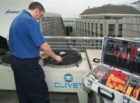Outsourcing the maintenance of building-services systems

The failure of an air-conditioning system can be caused by many factors.
The occurrence of a problem with a building-services system is not the time to start finding a specialist to put it right. The appointment of a service and maintenance provider is a much better approach — as Chris Trotman explains.As a facilities manager or a manager with responsibility for the electrical and mechanical services within a building, managing a plethora of specialist service engineers from a variety of companies is one headache that should be avoided. Scheduling site visits in to avoid disruption to the function of the building and the staff therein, together with a possible conflict of tasks being performed, will always be a challenge. Then of course there is the cost factor to be considered, not to mention security. In fact, the list of potential problems is pretty long. With the issue of health and safety now being a priority, all employers need to keep on top of a range of essential services — namely heating, lighting and the continuous provision of a secure power supply. No less important are plumbing and security. Because building-services equipment encompasses a wide range of engineering and consulting disciplines, appropriately qualified professionals should always be on call. When something goes wrong the usual course of action is to call in a service/contracting company with the necessary resources to fix the problem. If the original equipment manufacturer or installer provides such a service under a warranty or service agreement, this may be a satisfactory solution. The question that has to be raised is how cost effective is it to have separate service agreements for each component within the building. Also, in older buildings, tracing the OEM or installer can be a problem. The route that a growing number of companies is taking is to appoint a specialist building-services maintenance company that provides a comprehensive range of mechanical and engineering services. As technology has advanced, heating and ventilating systems have become more complex — even though the principles have remained constant. Chillers are still chillers, and boilers still do the same job. What has changed is the level of control and the technology behind how the equipment does its job. Thus the opportunities for failure have increased dramatically, making condition monitoring and ongoing maintenance essential. In particular, the failure of an air-conditioning system can be caused by many factors, such as fouling by contaminated water fouling or corrosion of coils, boilers valves etc., as well as faults in the electrical infrastructure. Every effort should be made to ensure that equipment providing ventilation, air-conditioning, heating, refrigeration, humidification and power draw is always operating at optimum efficiency. My company’s policy is to undertake a thorough review of a client’s requirements and produce a comprehensive service schedule that includes a strict set of protocols and checks to ensure that all work is fully implemented and regularly recorded. Engineers come at set intervals and times that fit in with the client’s operations — so they do not suffer any disruption, and business continuity is ensured. Clients also have the benefit that an engineer who has security approval and who is completely familiar with the premises is always available. Where servicing and maintenance is contracted out to a specialist company, the provider must be able to advise the client as to their health and safety responsibilities and, if requested, ensure that all equipment is fully compliant. Clearly, all new equipment will be compliant, but this should not be seen as an excuse for putting off maintenance. A programme of condition monitoring should be established by the provider at the outset, as this will enable the client to obtain the best possible life from the equipment. If, however, there is a form of equipment write-off or renewal policy at the end of a set period, the maintenance provider should establish effective dates for equipment replacement and how it is managed cost-effectively.

Outsourcing maintenance involves identifying the most appropriately qualified provider and establishing a long-term and mutually beneficial partnership.
Selecting a maintenance company can be made straightforward if the following steps are taken. The building manager is advised to run a thorough assessment of potential providers to ensure they have the necessary qualifications and trained staff to deal with fault finding, fault prediction and component servicing and replacement. Undertaking a comprehensive audit that compares the capabilities internal to the company with those offered by an outsourcing supplier should be a fundamental component in the decision-making process. Factors that should feature in this audit include cost, quality, delivery, control and exploitation. Look at the qualifications of the personnel involved. Check levels of compliance with established regulations. Check to make sure that they have a working knowledge of your equipment. Look at their training programmes. Check out how long they have been in business. Check out membership of regulatory bodies. Talk to customers and even visit their premises. Outsourcing maintenance involves identifying the most appropriately qualified provider and establishing a long-term and mutually beneficial partnership. Selecting the right provider is essential to the success of the outsourcing decision, as the supplier effectively becomes the offsite maintenance department. A balance has to be struck by both parties, with clearly defined roles and responsibilities being established that ensure that control-related issues are minimised and the partnership operates effectively. Taking short cuts with maintaining air-conditioning and ventilation systems can prove to be costly in the long run. Investing in a planned programme of maintenance will ensure that the installation meets, and even exceeds, its expected life. Chris Trotman is operations manager with Clivet Aircon Ltd.
Related links:
Related articles:




